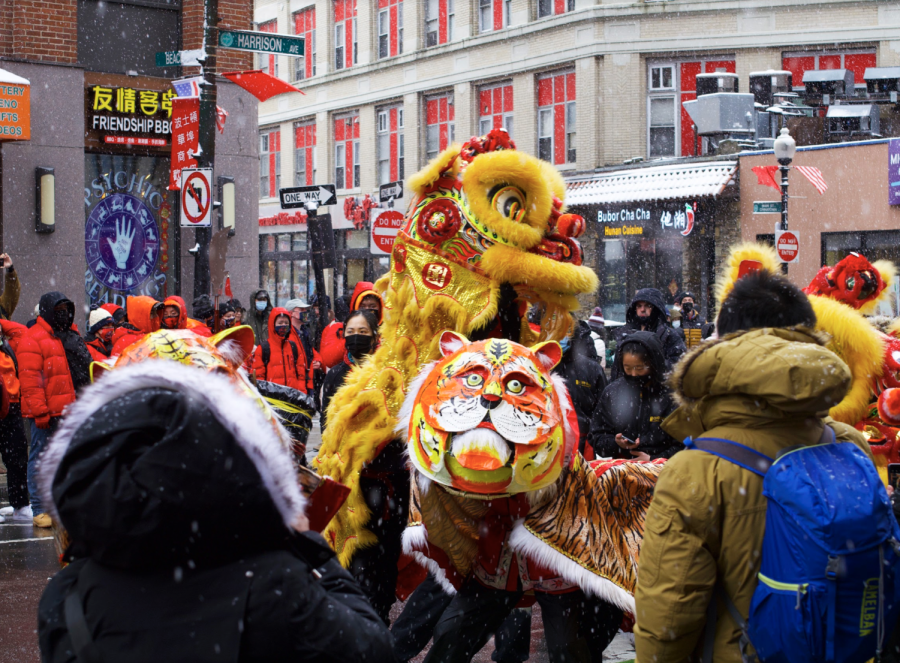Lunar New Year event discusses racism, community; promotes Chinatown businesses
Bostonians and tourists gathered in Chinatown Feb. 13 to witness the Lion Dance Parade. The event included discussions of anti-Asian hate in light of the pandemic.
February 25, 2022
Large crowds filled the streets of Chinatown Sunday Feb. 13 to witness the Lunar New Year Lion Dance Parade. Despite the snowy weather and the cold temperatures, many Boston residents and tourists, of different backgrounds and ethnicities, flocked to the neighborhood to celebrate this cultural event.
The lion dance is a form of traditional dance in Chinese and other Asian cultures where performers mimic lions’ movements in costume to bring good luck and fortune. The lion symbolizes strength, stability and wisdom, and the dance is a sacred ceremony, often saved for special occasions like Lunar New Year. And to ring in the year of the tiger, Boston’s Chinatown witnessed a triumphant return of the Lion Dance Parade after the COVID-19 pandemic halted performances for two years.
Mayor Michelle Wu gave a speech on a stage set up on Harrison Avenue before the lion dances began, calling upon Bostonians to support the city’s Chinatown community.
“Please support our local businesses. They very, very much need some love coming out of this pandemic,” Wu said. “So go have lunch after this [and] shop in our local businesses in Chinatown.”
While the entirety of the restaurant industry faced the impact of COVID-19, restaurants owned by Asians were most negatively impacted by the pandemic.
The earliest cases of COVID-19 broke out in Wuhan, China, which fueled negative bias toward Asians and Asian Americans. People of Asian descent took the blame for the pandemic, with former U.S. President Donald Trump coining racialized terms like the phrase “Kung Flu.” Since the onset of the pandemic, Asian populations have faced exacerbated versions of racism spanning from cultural to verbal and even physical attacks.
According to a report by the New York Federal Reserve, entrepreneurs aged 45 and older, who make up 80% of all small business owners, have been negatively impacted by COVID-19. In addition, small businesses owned by Asian Americans experienced greater losses in revenue than those owned by other non-white Americans.
Boston City Council president Ed Flynn followed Wu’s speech and underscored the significance of the xenophobia and racially-motivated prejudice Asian populations have faced throughout the pandemic.
“We also have to acknowledge the anti-Asian racism that we’ve seen in this community and across the country over the last two years, over the last several years,” he said. “We have more work to do making sure the voices of immigrants are heard across our country.”
Since the first case of COVID-19 in the U.S. was confirmed by state health officials in February, 2020, racism, hate-speech and hate crimes toward Asian people have accumulated.
An analysis from Ditch the Label and Brandwatch of 263 million online conversations in the U.K. and U.S. on social media blogs found that general hate speech increased 38% from 2019 to mid-2021. Hate speech toward Asian people more specifically, however, increased by an astounding 1,662%.
In September 2021, Stop AAPI Hate, a national coalition collecting data on racially-motivated attacks, reported that 1 in 5, or approximately 4.8 million, Asian Americans experienced a hate incident that year.
Other findings suggest that Boston is no exception. According to a report from Center for the Study of Hate and Extremism, the country’s largest cities like New York and Los Angeles saw the sharpest increase in Asian-targeted hate. But between 2019 and 2020, Boston saw a 133% change in anti-Asian hate crimes.
Despite a grim two years through the pandemic, the Lion Dance Parade was an opportunity to turn a new leaf and celebrate diversity while reflecting on the difficult experiences Asians and Asian Americans have faced in recent years.
Although the event was showered with inclement weather, Wu maintained a theme of optimism for the new year.
“We are here celebrating the snow as it comes down on a prosperous year … little snowflakes of luck,” Wu said.
The goal of the event was not only to celebrate Lunar New Year and to encourage the support of local businesses, but also to unite Asian and non-Asian communities
Mark Richardson, who is a senior financial systems analyst at Boston Medical Center, attended the parade with his wife Diana Richardson, the chief operating officer at Tufts Medical Center. Mark Richardson was there to see his wife give a brief welcoming statement to the crowd as the medical center’s speaker, who was sponsoring the event, and to enjoy cultural expression through the lion dances.
Diana Richardson said she was happy to represent the Tufts Medical Center as both the center’s speaker and as Chinatown’s neighbor.
“I got a chance [at] representing the sponsorship, to welcome everyone and say happy new year,” she said. “It’s exciting [because] we haven’t been able to do this for two years.”
The energetic and artistic cultural event funneled customers into surrounding Chinatown restaurants and businesses. Like many other attendees, Diana and Mark Richardson stuck around in the neighborhood long after the parade to grab lunch at a nearby eatery.
For Lawrence Kim, a freshman at Braintree High School, lion dances are something he’s seen his whole life. Although he said he used to be scared of the loud drums and ornate costumes of the performances as a child, he’s come to enjoy events like the Lion Dance Parade. This year, Kim attended the event with his friends.
Events like the Lion Dance Parade serve as a reminder that Boston is a culturally and ethnically rich city teeming with life from all around the globe. Celebrating Lunar New Year was an opportunity to rejoice in the beauty of Boston’s Asian community while recognizing the beginning of a new year.
“It’s bringing our culture in America,” Kim said.







